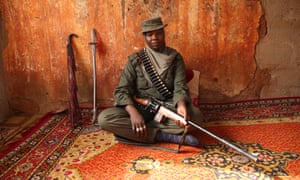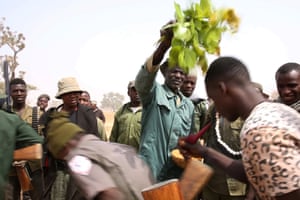The Hunters, The Hunted
"In the beginning, there was no problem. Hunters and insurgents met in the forest and everyone was doing their own business."
"We decided right then [when Boko Haram first took its deadly revenge], they won't stop until they kill all of us."
"Once you meet it [your prey, as a hunter], there are only two options: you kill it or it kills you."
"If you climb a tree you might be safe from an elephant. But not with Boko Haram. If you climb a tree, they'll shoot you."
Bunu Bukar, Nigerian hunter
 |
| Aisha Gombi Bakari, 38, is one of only a handful of female Boko Haram hunters. Photograph: Rosie Collyer |
Bunu Bukar was throughout his life as a hunter familiar with hunting big game. Hunters traditionally went off in groups, sometimes as many as a hundred people all together, for a major hunt when the bush would be tramped through, on the hunt for prey. More latterly, some Nigerian hunters have been absorbed for their skills in hunting and their intimate knowledge of the bush, by the Nigerian military. Their induction has been useful in the determination to roust the Boko Haram terrorists from bush hideouts.
And while the hunters useful in plying their trade, more accustomed to dealing with the habits of the animals they traditionally hunt, familiar with those who readily succumb, and those like elephants who can be ferocious in fighting back, they recognize there is little comparison with the terrorists who now comprise their prey for they are, like the hunters, armed and dangerous and fully capable of fighting on the same unforgiving terms of either kill or be killed.
The forests of northeastern Nigeria represent the traditional hunting grounds of those now being deployed to rout out the terrorists in Nigeria. Where, as children those hunters were trained to track the prints of wild pigs, antelopes and elephants through thick brush, they now hunt a different prey, one whose spoor is the exhaust of fuel and the tracks of motorcycles. The hunters are members of a century-old association of hunters.
 |
10,000 hunters gather in Nigeria’s North-East, seek clearance to confront Boko Haram in Sambisa Forest |
Now the Hunters/Vigilante Association in Borno State has become engaged. A week ago the military managed to release 82 girls from captivity with Boko Haram, who had been abducted among several hundred schoolgirls from the village of Chibok, attending a finishing school for girls, writing their final exams. The forests are familiar territory for the hunting group. Where once they tracked game, occasionally coming across Boko Haram militants, neither bothered the other.
But then the military began entering Boko Haram's forest fastness and followed them, chasing them as they set out on their countryside missions of devastating slaughter. In the unfamiliar terrain, the military asked for assistance of the hunters to guide them to where water could be found. When Boko Haram understood that the hunters were aiding the military, they decided to teach them a lesson. To that end they abducted a village leader of the hunters' group, decapitating him and placing his head neatly on his back.
The hunters responded by moving their families out of the rural villages to the capital, Maiduguri where they would be safe. And then the hunters decided they would integrate their hunting skills in tracking down Boko Haram with the military's missions to do the same. They now on occasion lead the military into battle, using their own long-barrelled guns they are skilled in manufacturing. When the hunters prepare for a forest mission they rub herbs on their bodies to mask their human scent. And they wear a number of protective spirit amulets.
 |
| Hunters are doused with a secret potion to grant them immunity to bullets. Photograph: Rosie Collyer |
Some of the hunters arm themselves with knives made by their grandfathers, with designs etched on the blades. They have discovered that the winning strategy begins with carving out a hole in a tree to act as a shield to wait for the entry of Boko Haram groups to pass by. Ambushes distinguish themselves by success. Sometimes the hunters recover war booty, taken from Boko Haram hideouts such as mobile phones and cash.
Sometimes the hunters use primitive-appearing weapons on their patrols. For example, a traditional gariyo, a cross between a farmer's sickle and a sword, a long hooked blade, deadly in the hands of someone expert in its use. They carry cellphones so they can be alerted when Boko Haram fighters are travelling in their direction on their motorcycles. When the ambushes succeed, the hunters block their progress, confront and kill the terrorists. To the terrorists, the hunters doubtless have become themselves terrorists.
Labels: Boko Haram, Hunters, Nigeria, Terrorism, Vigilantes

<< Home